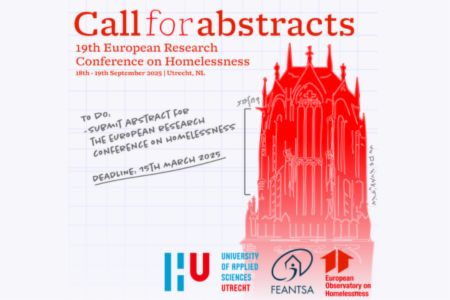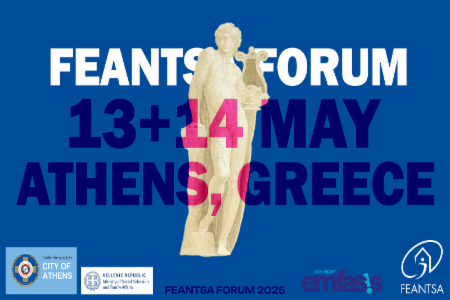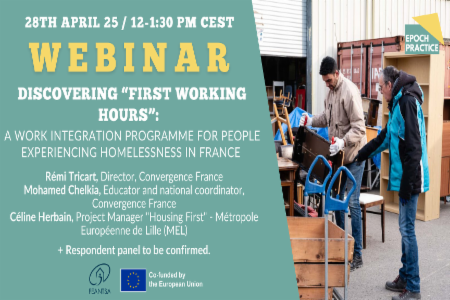INTERSECTIONS
Diving Into the FRA LGBTI Survey Data: Homelessness Briefing
Download the report here (PDF)

In 2019, the European Union Agency for Fundamental Rights (FRA) conducted the second round of the LGBTI Survey on the experiences of LGBTI people across Europe[1]. This briefing, and other briefings in the Intersections series[2], analyses the results of the FRA LGBTI Survey II and summarises the relevant data about experiences of homelessness among the LGBTI community.
The survey asked about experiences of housing difficulties, therefore the results do not show how many people are currently experiencing homelessness but rather the number of LGBTI people who have faced housing difficulties at any point across their lifetime.
Housing difficulties “refers to any point in a person’s life at which they had no place of their own (either owned or rented) where they could live and therefore were forced to stay with friends/family, stay in emergency or other temporary accommodation, a place not intended as a permanent home or had to sleep in a public space”. [3] This falls under the most widely used definitions of homelessness[4], however people who have spent periods of time couchsurfing or living in insecure housing are often reluctant to recognise those experiences as being homeless, therefore other terms which carry less stigma such as ‘housing difficulty’ can be useful in this kind of research[5]. In this briefing the terms experiencing ‘homelessness’ and ‘housing difficulty’ will be used interchangeably.
It should also be noted that as this survey was conducted online and many people facing housing difficulties have less access to the internet, it is likely that the numbers here are under-representative of the reality.
LGBTI people are particularly at risk of homelessness, making up an estimated 20-40% of the homeless population[6]. Family rejection, higher instances of poverty, lack of institutional and community support, and discrimination from landlords and employers all contribute to this increased vulnerability. However, LGBTI people are often invisible in conversations on addressing homelessness. Sexual orientation, gender identity and sex characteristics are often not registered by services, and from research we know that many LGBTI people don’t access relevant services out of fear of discrimination and violence. Many policies tackling homelessness don’t address the specific situation of LGBTI people despite being a known contributing factor, especially for younger people.
This has slowly begun to change, for example with the establishment of LGBTI-specific homeless services in Belgium, Italy and Slovenia, and growing research into homelessness among the LGBTI community[7]. What this research has shown is that sexual orientation, gender identity, gender expression and sex characteristics shape LGBTI people’s experiences of homelessness, their needs and therefore their pathways towards secure housing.
Targeted policy solutions and services are needed to address these factors and challenge the high rates of homelessness among the community. This briefing attempts to provide an overview of the risk factors and profile of LGBTI people with experiences of homelessness.
The methodology and background information on the survey are available in Annex 1. The full disaggregated data analysis is available in table form at this link. For this report, data were drawn both from the disaggregation file and from the FRA LGBTI Survey II data explorer.[8]
[1] [ FRA (European Union Agency for Fundamental Rights) (2020), A long way to go for LGBTI equality, Luxembourg, Publications Office. Available at: https://fra.europa.eu/en/publication/2020/eu-lgbti- survey-results
[2] Available from: https://www.ilga-europe.org/report/fra-lgbti-report-2019-intersections/
[3] Eurostat. Material deprivation, well-being and housing difficulties. 2018. European Commission. Available at: https://ec.europa.eu/eurostat/documents/1012329/8706724/2018+EU- SILC+module_assessment.pdf
[4] FEANTSA Ethos
[5] Quilty A. & Norris M. A Qualitative Study of LGBTQI+ Youth Homelessness in Ireland. 2019. Focus Ireland. Available at: https://www.focusireland.ie/wp-content/uploads/2021/09/LGBTQI-Youth- Homelessness-Report_FINAL-VERSION.pdf
[6] Fraser B, Pierse N, Chisholm E, Cook H. LGBTIQ+ Homelessness: A Review of the Literature. Int J Environ Res Public Health. 2019, 16(15). Available at: https://www.ncbi.nlm.nih.gov/pmc/articles/PMC6695950/
[7] See: Le Refuge Bruxelles, Quore Italy, Sqvot Slovenia
[8] FRA LGBTI II Survey data explorer, accessible at: https://fra.europa.eu/en/data-and-maps/2020/lgbti-survey-data-explorer





